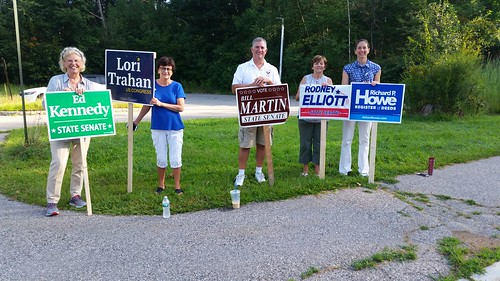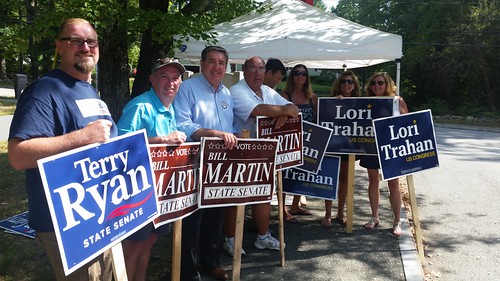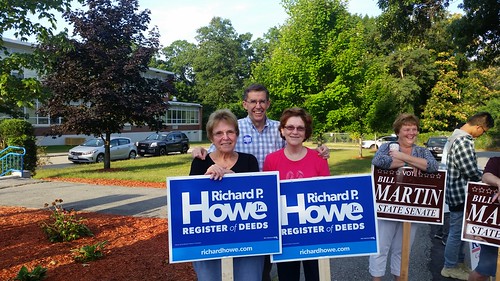Lowell Week in Review: September 9, 2018

Election Results
Here are the results of the contested races from Tuesday’s Primary Election:
Third Congressional District
- Lori Trahan – 18,368 votes (3,861 in Lowell)
- Dan Koh – 18,316 votes (992 in Lowell)
- Juana Matias – 12,914 votes (719 in Lowell)
- Barbara L’Italien – 12,890 votes (599 in Lowell)
- Rufus Gifford – 12,796 votes (2,161 in Lowell)
- Alexandra Chandler – 4,817 votes (359 in Lowell)
- Beej Das – 1,481 votes (382 in Lowell)
- Jeff Ballinger – 1,377 votes (269 in Lowell)
- Bopha Malone – 1338 votes (695 in Lowell)
- Leonard Golder – 582 votes (39 in Lowell)
1st Middlesex State Senate
- Ed Kennedy – 4,636 votes (2,938 in Lowell)
- John Drinkwater – 4,188 (2,331 in Lowell)
- Rodney Elliott – 3.509 votes (2,874 in Lowell)
- Bill Martin – 2,299 votes (1,481 in Lowell)
- Terry Ryan – 2,825 votes (550 in Lowell)
18th Middlesex State Representative
- Rady Mom – 1,274 votes
- Rithy Uong – 1,050 votes
- Jim Leary – 1,030 votes
- Sam Meas – 330 votes
Secretary of State
- William Galvin – 433,213 votes (6,826 in Lowell)
- Josh Zakim – 208,011 votes (2,389 in Lowell)
Governor (Democratic)
- Jay Gonzalez – 346,873 votes (5,085 in Lowell)
- Bob Massie – 191,622 votes (2,399 in Lowell)
Governor (Republican)
- Charlie Baker – 173,776 votes (1,082 in Lowell)
- Scott Lively – 98,214 votes (846 in Lowell)
Lt Governor (Democratic)
- Quentin Palfrey – 305,771 votes (3,953 in Lowell)
- Jimmy Tingle – 213,313 votes (3,420 in Lowell)
US Senator (Republican)
- Geoff Diehl – 143,735 votes (1,082 in Lowell)
- John Kingston – 69,429 votes (625 in Lowell)
- Beth Lindstrom – 46,614 votes (351 in Lowell)
Middlesex District Attorney
- Marian Ryan – 93,850 votes (5,484 in Lowell)
- Donna Patalano – 82,099 votes (2,965 in Lowell)
Governor’s Councilor
- Eileen Duff – 48,229 votes (4,925 in Lowell)
- Nicholas Torresi – 20,682 votes (2,414 in Lowell)
Second Essex & Middlesex State Senate
- Barry Finegold – 9,333 votes
- Mike Armano – 6,324 votes
- Pavel Payano – 4,081 votes
36th Middlesex State Rep
- Colleen Garry – 3,970 votes
- Sabrina Heisey – 1,438 votes
19th Middlesex State Rep
- David Robertson – 1,341 votes
- Judy O’Connell – 1,242 votes
- Mike McCoy – 1,100 votes
- Mark Kratman – 879 votes
- Erika Johnson – 533 votes
14th Middlesex State Rep
- Tami Gouveia – 4,753 votes
- Christian Krueger – 1,364 votes
- Ben Bloomenthal – 1,262 votes

Recounts
With Lori Trahan and Dan Koh separated by only 52 votes by the unofficial count, there will likely be a recount in the Third District Congressional race. Both sides have been collecting the necessary signatures to make that happen.
Even though Trahan has the lead and would be content to have the current outcome be the final one, it’s wise for her to take the steps necessary to have a recount for a couple of reasons. First, on the way to certifying the final vote, a town clerk or city election office might discover a transposed figure or some other error that could suddenly reverse the standings (which is highly unlikely, but so was a 52-vote margin of victory in a race with 85,000 votes cast).
Another possibility is that Koh could ask for a recount in selected communities rather than district-wide. The most likely outcome of a recount is that the vote totals might change but they should change in proportion to the overall vote received by a candidate. If Koh were to request a recount only in those communities that he won by large margins, he could pick up more votes than Trahan. By filing her own recount petition, Trahan could counter that strategy by requesting recounts in communities that she won by a large margin.
When I was first elected Register of Deeds, the Democratic Primary for that office resulted in a recount. More accurately, it resulted in ten recounts because each community in the registry of deeds district (Billerica, Carlisle, Chelmsford, Dracut, Dunstable, Lowell, Tewksbury, Tyngsborough, Westford and Wilmington) each held its own recount, all within a five day period.
Based on my own recount, here’s a general overview of what happens in each community:
The recount takes place in a large room such as the Mayor’s Reception Room at Lowell City Hall or a community meeting room or other big space within the town hall. The town clerk/chief election officer runs the show. The board of registrars of voters sit at a table in the front of the room. They serve as judges on disputed ballots. City election workers are then spread around the room in pairs with one reading the result from the ballot and the other marking that result on a tally sheet. The ballots are usually counted in blocks of 50. For example, Worker A looks at the Third Congressional District section of the first ballot and announces, “Trahan.” Worker B puts a mark in the Trahan column on the tally sheet. This continues until all the ballots have been counted. Usually there is a representative from the Secretary of State’s Office to monitor the process.
The two campaigns involved in the recount have big roles to play. Each appoints an attorney to be the campaign’s on-site representative. The attorney is the person who interacts with the registrars of voters. Then each campaign assigns a pair of observers to each counting station. One volunteer from the Trahan campaign will look over the shoulder of the election worker reading the votes from the ballots; another Trahan worker will look over the shoulder of the election worker marking the tally sheet. The Koh campaign will have volunteers filling the same roles. (It can get very crowded).
When a campaign observer detects a discrepancy, he or she raises a hand and the counting at that position stops. The town’s chief election officer or her designee comes to the counting station accompanied by the attorneys for the respective campaigns. The observer states the objection or concern and the disputed ballot is carried to the board of registrars. The attorney’s make their arguments, the registrars decided whether the vote is to be counted or not and for whom. If an attorney disagrees with that decision, she can object and that ballot is set aside. (Ballots that are set aside in this manner are the ones that would ultimately be reviewed by a judge if there was a court challenge to the results of the recount.
What are the types of things that draw objections? The election worker might misread that ballot, saying “Malone” instead of “Trahan.” Or the election worker marking the tally sheet could place a mark for Koh in the Matias column.
But the more common objections are to whether or not some mark on the ballot constitutes a vote. Let’s say when the voter was considering who to select, he let the ink marker touch the oval next to Barbara L’Italien’s name, leaving a discernable mark. But that same voter then colored in the oval next to Dan Koh’s name. If I were the Trahan observer, I would object to that ballot and claim that the voter had cast two votes for the same office (L’Italien and Koh) and the ballot should not be counted for either. On the other hand, if I were a Koh observer, I would keep my mouth shut because the initial determination in the recount went my way.
Another scenario might be that instead of darkening the oval, the voter put a check mark. If the check mark was next to Trahan’s name, the Koh observer would object, saying that was an invalid mark. When that ballot was taken to the registrars for their determination, they might look at how that voter marked the entire ballot. The legal standard is “What is the will of the voter?” If that voter used a check mark for every office on the ballot, the registrars would likely count the check mark as a vote for Koh because it was clear from the entire ballot checkmarks were how that voter cast his votes. However, if the voter had darkened all the ovals except for the one in the Congressional race which contained a check mark, then the registrars would likely not count that Congressional vote since the check mark was not consistent with the other votes on that ballot and the will of that voter could not be determined.
Some of this may seem trivial, but that’s how the process goes. Back in the late 1980s, Lowell’s Robert Kennedy won a seat on the governor’s council by a single vote after the case went through a district-wide recount and then a Superior Court trial. Every vote counts.

Richard Howe for Register of Deeds
Thanks to everyone who voted for me last Tuesday in the Democratic Primary. We’re on to November 6. Please help my campaign by making a donation or volunteering your time.
I thought they also had to do two identical sequential recounts, as well?